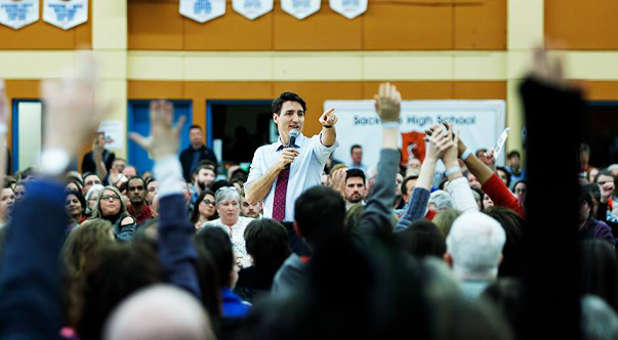NAFTA Revamped: New Pact Will Support ‘Hundreds of Thousands’ of U.S. Jobs
U.S. President Donald Trump on Monday said a new free trade agreement with Canada and Mexico would support hundreds of thousands of U.S. jobs, marking it as a victory in his push to reshape the lines of global commerce.
Financial markets breathed a sigh of relief that the United States and Canada had reached a last-minute deal on Sunday to preserve a single trading zone in North America after serious worries it could fragment under Trump’s trade pressures.
The deal is a reworking of the 1994 North American Free Trade Agreement, which underpins $1.2 trillion in trade between the three countries. Trump had described NAFTA as a bad deal for Americans and threatened to eliminate it as part of his “America First” agenda.
The new United States-Mexico-Canada Agreement (USMCA) is aimed at bringing more jobs into the United States, with Canada and Mexico accepting more restrictive commerce with the United States, their main export partner.
“These measures will support many—hundreds of thousands—American jobs,” Trump said in remarks at the White House.
“It means far more American jobs, and these are high-quality jobs.”
While changing NAFTA and bringing down U.S. trade deficits was a top Trump campaign pledge, Sunday’s agreement largely leaves the broader deal intact and maintains supply chains that would have been fractured under weaker bilateral deals.
U.S., Canadian and Mexican stocks were trading higher on Monday, with the benchmark S&P 500 index .SPX rising more than 0.6 percent and the Toronto Stock Exchange’s S&P/TSX index .GSPTSE gaining about 0.4 percent.
The Canadian dollar CAD=D4 strengthened to a four-month high against the U.S. dollar, while the Mexican peso MXN=D3 rose to near a two-month high against the greenback.
Trump called USMCA “the most important trade deal we’ve ever made by far,” replacing NAFTA, which he said was “perhaps the worst trade deal ever.”
Canadian Prime Minister Justin Trudeau on Sunday called it “a good day for Canada” after negotiators worked frantically ahead of the U.S.-imposed midnight deadline for a deal.
The pact preserved a key trade dispute settlement mechanism sought by Canada even as Ottawa agreed to open up its dairy markets to U.S. farmers.
The deal effectively maintains the current auto sector and largely spares Canada and Mexico from the prospect of U.S. tariffs on their vehicles, although it will make it harder for global auto makers to build cars cheaply in Mexico.
Trump vowed during his 2016 presidential campaign to tear up current U.S. trade deals, which he blamed for a loss of American manufacturing jobs. His administration has abandoned other trade accords and slapped tariffs on a number of key trading partners, including China.
“It’s a promise made, promise kept,” Peter Navarro, the White House trade adviser, told Fox News on Monday. “NAFTA is dead. We have USMCA.”
Steel Tariffs
Mexican Economy Minister Ildefonso Guajardo on Monday said the new accord could be signed by the three countries’ leaders when they meet at a G20 summit in Buenos Aires in late November.
The deal does not include any changes to separate U.S. tariffs on steel and aluminum levied earlier this year on many of Washington’s trading partners, including Canada, Mexico, China and the European Union.
Trump said the import tariffs – 25 percent on steel and 10 percent on aluminum – would remain in place for Canada and Mexico until they “can do something different like quotas, perhaps.”
“We are not going to allow our steel industry to disappear,” Trump said in his remarks on Monday.
Mexican Foreign Minister Luis Videgaray said earlier that he hoped concerns over the metals tariffs could be resolved before the new trilateral deal is signed.
U.S. officials intend to sign the deal by Nov. 30, Navarro said. It would then be submitted for approval by the U.S. Congress, currently controlled by Trump’s fellow Republicans.
U.S. Senator Pat Roberts, a Kansas Republican who oversees the Senate’s agricultural committee, said he was “eager to review the details” of the deal and noted the outsized role trade with Canada and Mexico had on rural U.S. states like his.
U.S. Senator Joni Ernst of Iowa, a top farming state, praised the agreement in a tweet on Monday: “Our farmers need stability and access to markets.”
Democratic U.S. Senator Amy Klobuchar of Minnesota, which borders Canada, also said she would review the terms and was glad her state’s “number one trading partner” was “back in the mix.”
The United States and Mexico clinched a bilateral agreement in late August after the Trump administration sought separate lines of talks, leaving Canada to negotiate its own terms.
A senior source close to the trade talks said Mexico’s Videgaray, Trudeau’s chief of staff Katie Telford and White House adviser Jared Kushner helped over the weekend to facilitate Sunday’s agreement. Advisers to Mexico’s incoming government, Marcelo Ebrard and Jesus Seade, were also consulted “in real time,” the source said.
© 2018 Thomson Reuters. All rights reserved. {eoa}














































